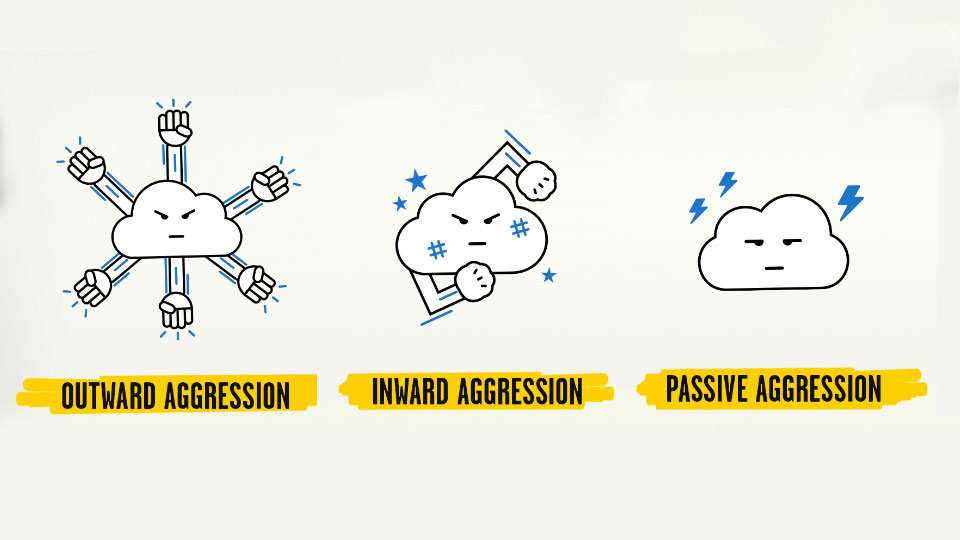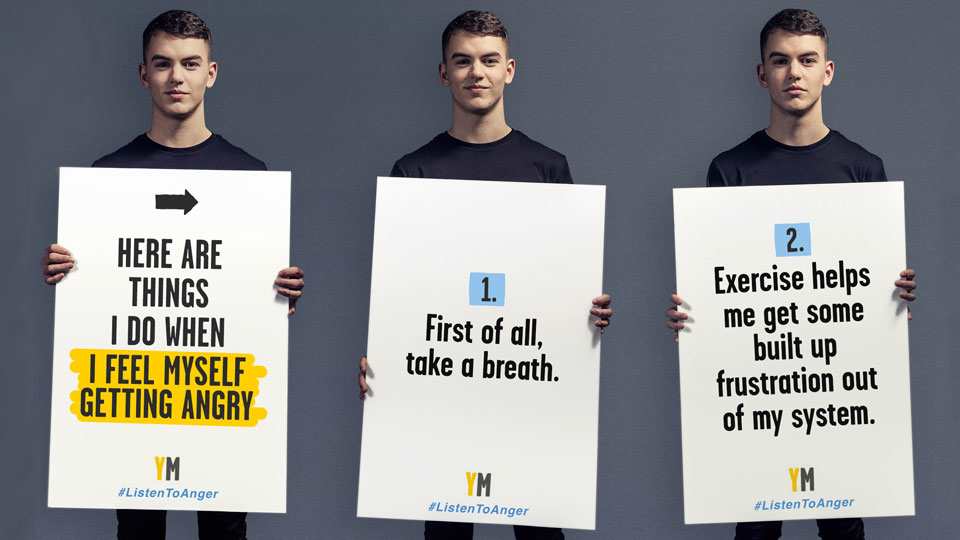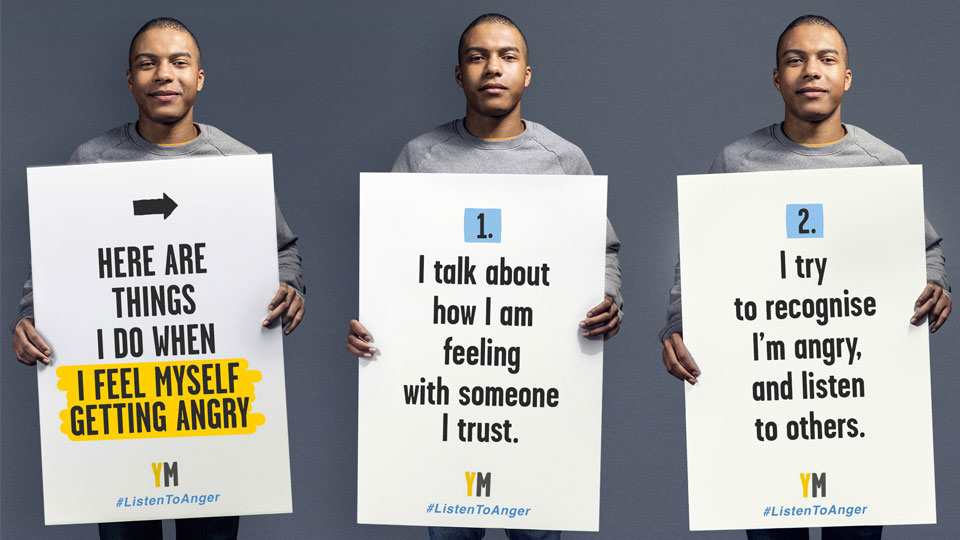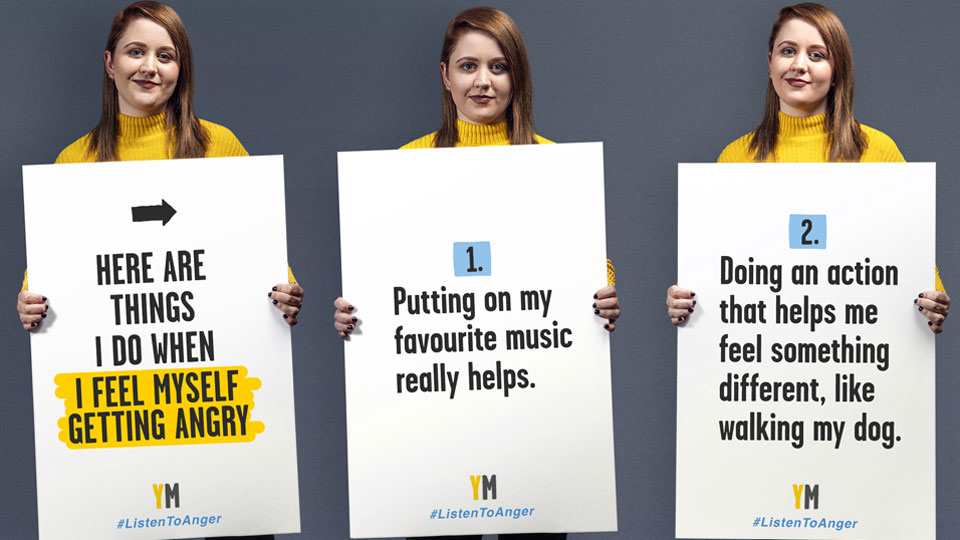Write it down
Keep a note of how you're feeling:
- What happened that made you angry?
- How did you respond? Did it help?
- How did you feel afterwards?
- What else is on your mind? Is there something making you feel worried, scared or alone?

Three animated clouds are next to each other, the first cloud has lots of punching fists coming out if it with the words underneath highlighted in yellow: 'outward aggression'. The second cloud has marks on its cheeks, aiming punches towards itself with the words highlighted in yellow underneath 'inward aggression', the third cloud looks fed up and has thunderbolts around it, the words underneath highlighted in yellow read: 'passive aggression'.
Anger is one of a range of emotions that we all experience. It’s ok and perfectly normal to feel angry about things that you have experienced.
Anger can start to become a problem when you express it through unhelpful or destructive behaviour – either towards yourself or other people. It can also contribute to you developing mental health problems, like depression and anxiety, or make existing problems worse.
If you find yourself doing these sorts of things, it might be a sign that you need some support:
Do you often find yourself being aggressive towards other people?
Are you frightening or worrying yourself, or those around you with your behaviour?
Do you tell yourself that you hate yourself, that you're useless, that you don't deserve things?
Do you shut yourself off from the world, deny yourself things that make you happy or self-harm?
Do you behave passive-aggressively towards other people? Do you ignore people, refuse to speak to them, or are you often sarcastic or sulky?
Everyone feels angry sometimes - and we all have different triggers. You may experience anger in situations where you feel powerless, or frustrated. This could be because of problems at home or school, or if you've fallen out with a friend, or had a break-up with a partner. You might start to feel angry if you feel misunderstood by people around you, like your parents, or if you are confused about your sexuality.
But sometimes, you can feel angry and not know why. This could be the result of lots of stress and different pressures building up around you. Or it could be because of something that happened to you in the past, like neglect or abuse. Recognising the types of situations which trigger your anger is the first step to figuring out what is causing it, and finding a way to make things better.
What happened the last time you were angry? We asked several people what anger feels like for them, and how they manage it.

When we get angry, it can be hard to think things through – especially if that anger seems overwhelming or uncontrollable. And if we feel angry a lot of the time – in other words, if we get into constant patterns of thinking angry thoughts about ourselves or others – it’s hard to take a step back and communicate in a healthy and productive way.
We may tense up and clench our teeth. Our hearts might pump faster, our stomachs might churn, and we may clench our fists. These are useful early warning signs that we are getting wound up.
Sometimes, it can be difficult to recognise just how much anger you are feeling, and how it is affecting you. This might be because you have lots of things going on in your life.
After getting angry about something you might start to feel guilty about it, and this can make you feel worse.

The same young person wearing a black t-shirt holds three signs. The signs read:
Here are things I do when I feel myself getting angry.
1. First of all, take a breath
2. Exercise helps me get some built-up frustration out of my system

The same young person wearing a grey jumper holds three signs. The signs read:
Here are things I do when I feel myself getting angry
1. I talk about how I am feeling
2. I try and recognise I'm angry and listen to others

The same young person has long brown hair and wears a yellow jumper, they hold three signs which read:
Here are things I do when I feel myself getting angry
1. Putting on my favourite music really helps
2. Doing an action that helps me feel something different, like walking my dog
Issues with anger can lead to risky behaviour, refusing to go to school, isolation, eating problems, depression, and self-harm.
Drinking too much alcohol or taking drugs might be seen as ways of coping with anger issues, but remember they will make you feel worse and are likely to create bigger problems later.
Over time, you’ll learn to manage your anger better yourself. When you feel angry or stressed you can try out different relaxation techniques to help you calm down, such as:
If you have a problem with someone, think about what you want to say beforehand and how you want to get your point across. Listen to their point of view and calmly put yours across too.
If you feel your anger levels rising, walk away from a situation to calm down, rather than saying or doing something you might regret later. You can learn to manage your anger and find techniques that work for you.
If you often feel angry there are things you can do to help yourself. Other people can help too.
Talk about how you are feeling. Parents or carers and other family members, such as grandparents, may be good listeners. Your close friends and other family friends may be able to help.
At school, find a teacher, mentor, counsellor or school nurse who you trust. In the community, social workers, youth workers and leaders will also be able to listen.
You can also see your GP. They may be able to suggest some treatment or recommend a counsellor.
Your GP may refer you to your child and adolescent mental health service (CAMHS) where you would talk to a specialist about your feelings and behaviour. The specialist may advise you how to deal with these. They may also suggest counselling if there are problems or things that happened in the past that may be causing your anger issues now.
If counselling is your best option, the specialist arranges a series of confidential one-to-one sessions with a counsellor or therapist.
You can talk with them about concerns or problems you might have. The counsellor will help you work through your issues and give you skills and strategies to deal with your anger better.
Keep a note of how you're feeling:
It helps to talk about how you're feeling. You could try saying:
Here are some organisations and helpline services who can support you with what you're going through right now.
If you’re under 19 you can confidentially call, chat online or email about any problem big or small.
Sign up for a free Childline locker (real name or email address not needed) to use their free 1-2-1 counsellor chat and email support service.
Can provide a BSL interpreter if you are deaf or hearing-impaired.
Hosts online message boards where you can share your experiences, have fun and get support from other young people in similar situations.
Offers support to anyone under 25 about anything that’s troubling them.
Email support available via their online contact form.
Free 1-2-1 webchat service available.
Free short-term counselling service available.
Provides information about local counselling and advice services for young people aged 12-25.
You can find local services on their website.